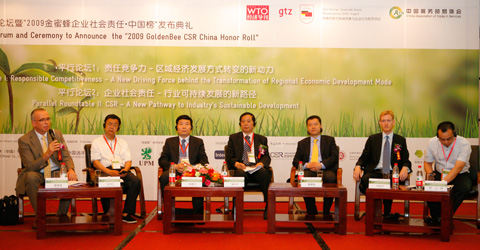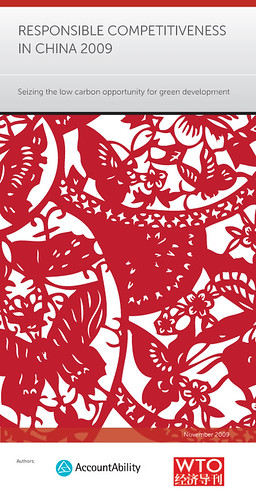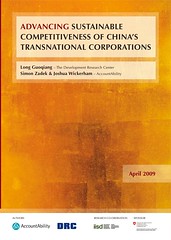June 5th, 2010 by JJW

Fifth annual Golden Bee Conference: Regional Responsible Competitiveness Panel, image courtesy of WTO Tribune
Here is a summary of my remarks at the fifth annual Golden Bee conference in Beijing, speaking on a panel about how governments, companies, and civil society are working together to shift markets to reward responsible business action and make development more sustainable.
The session was chaired by the head of the Sino-German CSR Project, Rolf Dietmer, and had representatives from four provincial and district CSR initiatives, including Shandong, Shanghai Pudong, Jiangsu and Sichuan, plus a representative form China Unicom. My work with Chinese provincial economics planners has centered on the textiles and medicines sectors in Zhejiang through Responsible Competitiveness work with AccountAbility.
WTO Tribune wrote an article here (“Government duty-bound “responsibility”….in Chinese: ??“?”???) about the session here and captured some of my main points, but which I summarize here. (The entire transcript of my remarks in Chinese can be found here.
My main points:
1) Shifting markets to reward responsible business action requires a level playing field that no single sector (civil society, government, or business) can provide;
2) Chinese government officials at the provincial level are unsurpassed globally in their level of innovation and activity to promote new ways ;
3) Each provincial system is unique and there is need for coordination amongst local governments, the center and international stakeholders;
4) This unique approach to promoting sustainable development is both an asset and a liability, because if Chinese stakeholders do not coordinate properly, their market signals will be ignored by international buyers, ie, Chinese standards may not be recognized;
5) Chinese government officials, working with businesses, and using the power of the government bureaucracy, the media and civil society to promote good company practices and punish the bad, have the chance to clarify the way voluntary sustainability standards (such as the SA8000, GRI, ISO, AA1000, CSC9000T, FSC, etc) mature at the national and international levels;
6) Rather than create additional hoops for companies to jump through, governments can achieve economic, social environmental objectives by leveraging existing market mechanisms such as voluntary sustainability standards.
I add a point 7) International voluntary sustainability standards systems should see the power of Chinese stakeholders to pick winning standards as a wake-up call to be more serious about engaging in China and as an opportunity to scale up the impacts of their standards, since China plays such an integral part in so many global supply chains.
April 10th, 2010 by JJW
 This year’s survey and cover story on Chinese managers’ attitudes toward corporate social responsibility focuses on the role of consumers in driving sustainable consumption in China–and, increasingly, the world. Written by myself and AccountAbility’s Kate Ives, and Shi Yi.
This year’s survey and cover story on Chinese managers’ attitudes toward corporate social responsibility focuses on the role of consumers in driving sustainable consumption in China–and, increasingly, the world. Written by myself and AccountAbility’s Kate Ives, and Shi Yi.
This issue also has great inside shots of a BYD car factory floor.
Read the English version here and the Chinese version here.
Read the 2009 version and 2008 version.
December 25th, 2009 by JJW

On November 30, I joined colleagues at the EU China Business Summit in Nanjing, Jiangsu, which dovetailed with the EU-China political meeting.
That day in Nanjing, under support from the Sino-Swedish Corporate Social Responsibility cooperation, AccountAbility launched the report Responsible Competitiveness in China 2009: Seizing the low carbon opportunity for green development.
This from AccountAbility:
Businesses in China are increasingly working with government and civil society to shift markets to reward sustainable development. These responsible business practices are becoming more and more embedded in the country’s emerging green industrial policy and low carbon development pathways. In some areas, China is set to leapfrog into the elite group of global green innovators.
These are some of the highlights from the report ‘Responsible Competitiveness in China 2009: Seizing the low carbon opportunity for green development’, launched at the 5th annual EU-China Business Summit as part of the Swedish EU presidency on 30 November in Nanjing, China.
The analysis presented in this report shows that China is developing a distinctive low carbon, responsible pathway, namely that:
- Low carbon industrial policies offer Chinese businesses and consumers huge opportunities
- Responsible business ventures in China are now impacting global markets relaunching China’s brand
- Strong government leadership, incentives and supportive policies are playing key roles
The report was independently researched and written in a unique collaboration between AccountAbility and the China WTO Tribune, with support from the Sino-Swedish CSR Cooperation Project. Learn more about the report’s key findings.
The Joint Statement of the 12th EU-China Summit specifically “decided to strengthen high-level dialogue and exchanges between think-tanks from both sides, and to promote and support regular exchanges.” Read the Joint Statement in full. AccountAbility’s partnership with the China WTO Tribune is an example of this kind of knowledge and collaboration exchange.
November 18th, 2009 by JJW
 I took Obama’s visit as a chance to write about how company action should play a more prominent role in the trust building and competitiveness equation of the Sino-US relationship. My Guardian article, A green call to arms, (link to Chinese version here) centers on climate change. Meanwhile, my ChinaDialogue piece, Obama’s China moment (and the Chinese version) addresses wider issues of corporate social responsibility. I focus especially on sustainability standards and other global “rules of the game” that the US and Chinese governments should encourage companies to improve jointly.
I took Obama’s visit as a chance to write about how company action should play a more prominent role in the trust building and competitiveness equation of the Sino-US relationship. My Guardian article, A green call to arms, (link to Chinese version here) centers on climate change. Meanwhile, my ChinaDialogue piece, Obama’s China moment (and the Chinese version) addresses wider issues of corporate social responsibility. I focus especially on sustainability standards and other global “rules of the game” that the US and Chinese governments should encourage companies to improve jointly.
Guardian: A green call to arms (Chinese)
ChinaDialogue: Obama’s China moment (Chinese)
May 5th, 2009 by JJW
 A Paper by Long Guoqiang, Simon Zadek, and Joshua Wickerham
A Paper by Long Guoqiang, Simon Zadek, and Joshua Wickerham
AccountAbility’s Managing Partner, Simon Zadek, launched this report at the Boao Forum this year in Hainan and at the China Entrepreneur Club’s Daonong Green Companies Forum in Beijing. This paper is part of a two-year study with the State Council’s Development Research Center on “China’s sustainable trade strategy” working with several central-level Chinese research organizations and three international think tanks.
This paper examines how the Chinese business community can best use international sustainability standards to enhance their competitiveness in global markets and more effectively place themselves on a sustainable economic pathway.
It highlights the opportunity for Chinese businesses, supported by enabling public policies, to become a force in shaping the next generation of sustainability standards in global markets as a competitive strategy consistent with China’s broader interests. Doing so will require deeper engagement in existing standards initiatives, and a more explicit role amongst the communities that have developed and now govern them. Effective engagement in such standards is a means of off-setting competitive disadvantages, and creating competitive advantages when businesses and nations choose a more sustainable development path.
This paper sets out both strategic options for businesses and policy options for the Chinese government to realise sustainable development and competitiveness goals.
Download the full English version, full Chinese version, or the bilingual executive summary.
AccountAbility DRC _ China Sustainable Trade Strategy_Press Release_Chinese and English the press release.
Mentioned in the Harvard Business Review blog here.
Video interview with me on NetEase discussing link between sustainability and Chinese competitiveness (in Mandarin Chinese).



 I took Obama’s visit as a chance to write about how company action should play a more prominent role in the trust building and competitiveness equation of the Sino-US relationship. My Guardian article,
I took Obama’s visit as a chance to write about how company action should play a more prominent role in the trust building and competitiveness equation of the Sino-US relationship. My Guardian article, 
